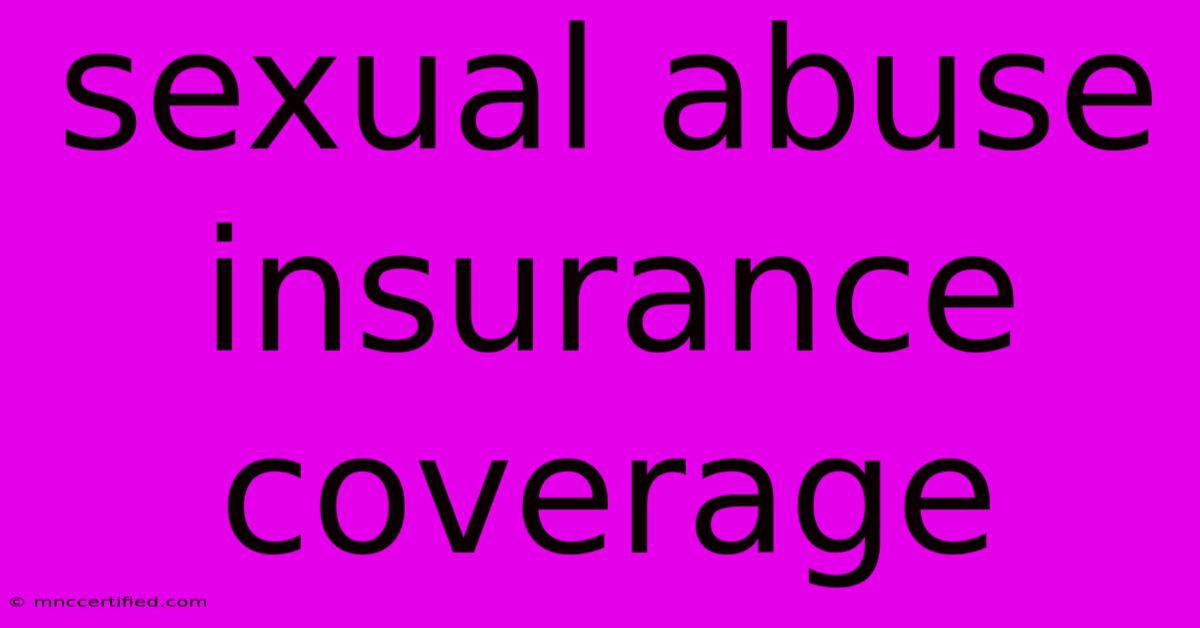Sexual Abuse Insurance Coverage

Table of Contents
Sexual Abuse Insurance Coverage: What You Need to Know
Sexual abuse is a devastating crime with lifelong consequences for victims. For institutions and individuals, the financial fallout from allegations and lawsuits can be equally crippling. This is where sexual abuse insurance coverage comes in. Understanding the nuances of this specialized insurance is crucial for protecting your organization or yourself from potentially catastrophic financial losses.
What is Sexual Abuse Insurance?
Sexual abuse insurance, often a component of broader liability insurance policies or offered as a standalone product, provides financial protection against claims of sexual abuse or molestation. This coverage typically includes legal defense costs, settlements, and judgments awarded to victims. It’s crucial to remember that this insurance doesn't cover intentional acts; it aims to mitigate the financial burden of claims arising from allegations, even if those allegations are ultimately proven false.
Types of Sexual Abuse Insurance Coverage:
-
Professional Liability Insurance (for professionals): This protects professionals like therapists, teachers, and coaches against claims of sexual abuse arising from their professional interactions. This is particularly important for individuals working with vulnerable populations.
-
General Liability Insurance (for businesses): This broader coverage might include sexual abuse protection as an add-on or endorsement. It protects businesses against claims stemming from sexual abuse incidents occurring on their premises or involving their employees.
-
Directors and Officers (D&O) Insurance: This covers directors and officers of organizations against claims related to their management decisions, which could include failing to adequately address sexual abuse allegations or prevent such incidents.
-
Employment Practices Liability Insurance (EPLI): EPLI often includes coverage for sexual harassment and related claims. While not solely focused on sexual abuse, it provides crucial protection against employment-related claims that might stem from such incidents.
Who Needs Sexual Abuse Insurance?
The need for sexual abuse insurance varies widely depending on the nature of your work or organization. However, the following groups should strongly consider securing this crucial protection:
-
Schools and Educational Institutions: Protecting students is paramount, making sexual abuse insurance essential for schools at all levels.
-
Churches and Religious Organizations: These organizations often work with vulnerable populations and are particularly susceptible to allegations.
-
Healthcare Providers: Therapists, counselors, and other healthcare professionals who interact with vulnerable individuals should prioritize this type of coverage.
-
Youth Organizations: Any organization working with children or young adults needs comprehensive protection against sexual abuse allegations.
-
Non-profit Organizations: Given their often limited resources, non-profits are particularly vulnerable to the financial impact of sexual abuse lawsuits.
Key Considerations When Choosing Sexual Abuse Insurance:
-
Policy Limits: Understand the maximum amount your policy will pay out for a single claim or over the policy period. Ensure the limits are sufficient to cover potential costs.
-
Coverage Exclusions: Carefully review the policy's exclusions to identify any situations or claims not covered. This might include intentional acts or pre-existing conditions.
-
Defense Costs: Confirm that legal defense costs are covered, as these can quickly escalate.
-
Claims Process: Understand the claims process and the insurer's responsibilities in handling allegations.
-
Insurer Reputation: Choose a reputable insurer with a proven track record of handling claims fairly and efficiently.
The Importance of Prevention:
While insurance provides crucial financial protection, proactive measures to prevent sexual abuse are even more critical. Institutions should implement robust policies, training programs, and reporting mechanisms to foster a safe environment and minimize the risk of such incidents. Prevention is the best protection.
Conclusion:
Sexual abuse insurance is not a luxury; it's a necessity for many organizations and individuals. Understanding the different types of coverage, key considerations, and the importance of prevention can help you make informed decisions to protect your financial future and the well-being of those in your care. Consult with an insurance professional to determine the appropriate level of coverage for your specific needs. Don't wait until it's too late; secure your protection today.

Thank you for visiting our website wich cover about Sexual Abuse Insurance Coverage. We hope the information provided has been useful to you. Feel free to contact us if you have any questions or need further assistance. See you next time and dont miss to bookmark.
Featured Posts
-
Samsons Paradise Return Unexpected Feedback
Nov 23, 2024
-
Tonights Top News Headlines
Nov 23, 2024
-
Football Recap Plymouth 1 Watford 2
Nov 23, 2024
-
F1 Academy 2025 Alba Hurup Larsen For Tommy Hilfiger
Nov 23, 2024
-
Suspicious Activity Prompts Chester Response
Nov 23, 2024